
Landmark Lecture Series
The annual RWS Landmark Lecture invites prominent scholars in Rhetoric and Writing Studies to discuss current research and pedagogy in our field. Information about the current lecture can be found on our News and Events page.
Past Lectures
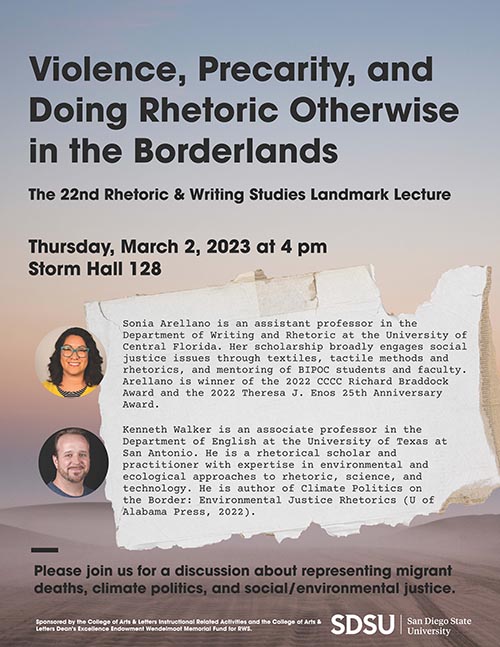 Violence, Precarity, and Doing Rhetoric Otherwise in the Borderlands
Violence, Precarity, and Doing Rhetoric Otherwise in the Borderlands
Thursday, March 2, 2023
Sonia Arellano is an assistant professor in the Department of Writing and Rhetoric at the University of Central Florida. Her scholarship broadly engages social justice issues through textiles, tactile methods and rhetorics, and mentoring of BIPOC students and faculty. Arellano is winner of the 2022 CCCC Richard Braddock Award and the 2022 Theresa J. Enos 25th Anniversary Award.
Focusing on the US/Mexico border, particularly in Arizona, Arellano will discuss how state-sanctioned violence results in migrant deaths that can never really be quantified or fully known. Arellano questions how we study the lives of those who leave behind no written record, and how we deem lives worth grieving. Considering rhetorical projects that contribute to the larger immigration debate, Arellano will discuss how we can further consider the violence of borders worldwide.
Kenneth Walker is an associate professor in the Department of English at the University of Texas at San Antonio. He is a rhetorical scholar and practitioner with expertise in environmental and ecological approaches to rhetoric, science, and technology. He is author of Climate Politics on the Border: Environmental Justice Rhetorics (U of Alabama Press, 2022).
Telling stories across his community-engaged and transdisciplinary research in borderlands rhetorical ecologies, Walker will discuss how transnational rhetorical praxis grapples with the violence and precarity of nation-states while pointing to alternative practices of belonging informed by border-crossing human and nonhuman kin. Moving from community, scholarly, and student examples of geolocated narratives, borderlands storymaps, and restor(y)ing migratory birds across South Texas and Greater Mexico, Walker will discuss the value of transnational and transdisciplinary rhetorical ecologies for interventions into regenerative futures that foster multiple worlds.
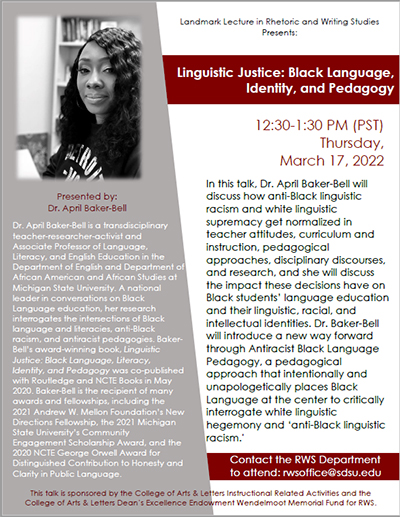
Linguistic Justice: Black Language, Literacy, Identity, and Pedagogy
Lecture by April Baker-Bell
Thursday, March 17, 2022
In this talk, Dr. April Baker-Bell will discuss how anti-Black linguistic racism and white linguistic supremacy get normalized in teacher attitudes, curriculum and instruction, pedagogical approaches, disciplinary discourses, and research, and she will discuss the impact these decisions have on Black students’ language education and their linguistic, racial, and intellectual identities. Dr. Baker-Bell will introduce a new way forward through Antiracist Black Language Pedagogy, a pedagogical approach that intentionally and unapologetically places Black Language at the center to critically interrogate white linguistic hegemony and anti-Black linguistic racism.
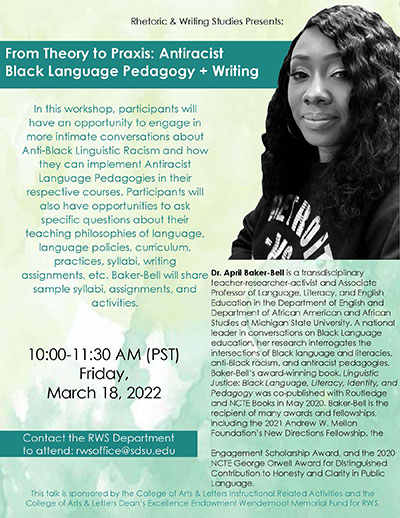 From Theory to Praxis: Antiracist Black Language Pedagogy + Writing
From Theory to Praxis: Antiracist Black Language Pedagogy + Writing
Workshop with April Baker-Bell
For RWS Faculty Only
Friday, March 18, 2022
In this workshop, participants will have an opportunity to engage in more intimate conversations about Anti-Black Linguistic Racism and how they can implement Antiracist Language Pedagogies in their respective courses. Participants will also have opportunities to ask specific questions about their teaching philosophies of language, language policies, curriculum, practices, syllabi, writing assignments, etc. Baker-Bell will share sample syllabi, assignments, and activities.
About April Baker-Bell
Dr. April Baker-Bell is a transdisciplinary teacher-researcher-activist and Associate Professor of Language, Literacy, and English Education in the Department of English and Department of African American and African Studies at Michigan State University. A national leader in conversations on Black Language education, her research interrogates the intersections of Black language and literacies, anti-Black racism, and antiracist pedagogies, and is concerned with antiracist writing, critical media literacies, Black feminist-womanist storytelling, and self-preservation for Black women in academia, with an emphasis on early career Black women.
Baker-Bell’s award-winning book, Linguistic Justice: Black Language, Literacy, Identity, and Pedagogy, brings together theory, research, and practice to dismantle Anti-Black Linguistic Racism (a term Baker-Bell coined) and white linguistic supremacy. The book provides ethnographic snapshots of how Black students navigate and negotiate their linguistic and racial identities across multiple contexts, and it captures what Antiracist Black Language Pedagogy looks like in community with Black youth. Linguistic Justice features a range of multimodal examples and practices through instructional maps, charts, artwork, and stories that reflect the urgent need for antiracist language pedagogies in our current social and political climate.
Baker-Bell is the recipient of many awards and fellowships, including the 2021 Andrew W. Mellon Foundation's New Directions Fellowship, the 2021 Michigan State University's Community Engagement Scholarship Award and the 2021 Distinguished Partnership Award for Community-Engaged Creative Activity, the 2020 NCTE George Orwell Award for Distinguished Contribution to Honesty and Clarity in Public Language, the 2019 Michigan State University Alumni Award for Innovation & Leadership in Teaching and Learning, and the 2018 AERA Language and Social Processes Early Career Scholar Award.
Designing and Sustaining Writing Programs for and with Multilingual Students
Wednesday, April 7, 2021
Presented by Dr. Laura Gonzales, University of Florida
In this workshop, Gonzales will argue that multilingual students have important strengths and experiences that should be centralized in the development of writing programs. Positioning translation as a rhetorical technology that multilingual writers practice every day, Gonzales will suggest that language diversity should be a central component of writing curricula design across areas of specialization, including first-year composition and professional writing. Language diversity is an asset that should inform writing education, particularly as students prepare to work as effective communicators in contemporary academic, business and community contexts. This hands-on workshop will include possibilities for instructors to consider how they might incorporate language diversity issues and activities into their courses.
Teaching Online Writing Courses
In this workshop, Professor Warnock will work with attendees to develop specific aspects of teaching online writing courses (OWCs). We will discuss “migrating” your best teaching self-online. Then we will focus on creating robust, conversational asynchronous writing environments that complement remote, synchronous course modalities. We will also look at managing instructor time in OWCs and “studenting”—the student perspective in such courses.
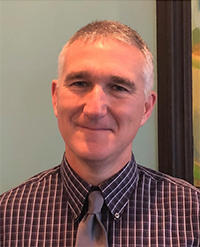 Scott Warnock is a Professor of English and the Director of the University Writing Program at Drexel
University. He is the author of Teaching Writing Online: How and Why; Writing Together:
Ten Weeks Teaching and Studenting in an Online Writing Course, with Diana Gasiewski;
and numerous chapters and journal articles about online writing instruction, computers
and composition, and education technology. He has spoken about teaching and technology
issues and opportunities at many institutions and conferences. Warnock is Immediate
Past President of the Global Society of Online Literacy Educators after having served
as President from 2018 to 2020
Scott Warnock is a Professor of English and the Director of the University Writing Program at Drexel
University. He is the author of Teaching Writing Online: How and Why; Writing Together:
Ten Weeks Teaching and Studenting in an Online Writing Course, with Diana Gasiewski;
and numerous chapters and journal articles about online writing instruction, computers
and composition, and education technology. He has spoken about teaching and technology
issues and opportunities at many institutions and conferences. Warnock is Immediate
Past President of the Global Society of Online Literacy Educators after having served
as President from 2018 to 2020
Sponsored by a College of Arts and Letters IRA Grant
Are We There Yet? Models for Open-Access Publishing and Open Education Resources in Writing Studies
This lecture examines the power and possibility of open access publication and educational resources in writing.
Some have called it a publishing crisis. Others have called it an opportunity for scholars to regain control of their intellectual work. Almost everyone recognizes that higher education, and writing studies in particular, faces a set of challenges that are both interrelated and resistant to easy resolution: high costs for journal subscriptions and database access, financial pressures on university presses and academic publishers, changes in the kinds of instructional materials used in our courses, and the recognition of the need to reduce the cost of attending college. The speakers in this year’s Rhetoric and Writing Studies Landmark Lecture will explore the factors that have given rise to these challenges and consider how open-access publishing and the development of open educational resources are allowing us to address the challenges we face as scholars and educators.
A brief question and answer session will follow their discussion.
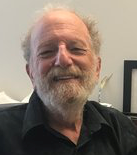 Charles Bazerman, Distinguished Professor of Education at the University of California Santa Barbara,
is Founder and Former Chair of the International Society for the Advancement of Writing
Research and former Chair of the Conference on College Composition and Communication.
His books include A Rhetoric of Literate Action, A Theory of Literate Action, The
Languages of Edison's Light, Constructing Experience, Shaping Written Knowledge, The
Informed Writer, The Handbook of Research on Writing, Traditions of Writing Research,
Genre in a Changing World, What Writing Does and How It Does It, and Lifespan Development
of Writing Abilities.
Charles Bazerman, Distinguished Professor of Education at the University of California Santa Barbara,
is Founder and Former Chair of the International Society for the Advancement of Writing
Research and former Chair of the Conference on College Composition and Communication.
His books include A Rhetoric of Literate Action, A Theory of Literate Action, The
Languages of Edison's Light, Constructing Experience, Shaping Written Knowledge, The
Informed Writer, The Handbook of Research on Writing, Traditions of Writing Research,
Genre in a Changing World, What Writing Does and How It Does It, and Lifespan Development
of Writing Abilities.
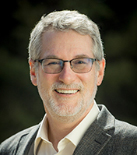 Mike Palmquist is Associate Provost for Instructional Innovation, Professor of English, and University
Distinguished Teaching Scholar at Colorado State University, where he supports university-wide
efforts to enhance learning and teaching across the disciplines. His scholarly interests
include writing across the curriculum, the effects of computer and network technologies
on writing instruction, and new approaches to scholarly publishing. He has published
widely within the field of writing studies and serves as the founding editor of the
WAC Clearinghouse (wac.colostate.edu), a successful open-access publishing project
that involves more than 150 editors, reviewers, and designers from inside and outside
the United States.
Mike Palmquist is Associate Provost for Instructional Innovation, Professor of English, and University
Distinguished Teaching Scholar at Colorado State University, where he supports university-wide
efforts to enhance learning and teaching across the disciplines. His scholarly interests
include writing across the curriculum, the effects of computer and network technologies
on writing instruction, and new approaches to scholarly publishing. He has published
widely within the field of writing studies and serves as the founding editor of the
WAC Clearinghouse (wac.colostate.edu), a successful open-access publishing project
that involves more than 150 editors, reviewers, and designers from inside and outside
the United States.
Multimodal Composing: Writing/Designing Futures
In this workshop, Professor Arola will briefly outline the goals, potentials, and pitfalls of a multimodal pedagogy. She will share some of the ways that assigning and assessing multimodal projects, specifically through the lens of a slow composition rooted in an American Indian epistemology, can help to meet the outcomes of writing courses. Participants will try their hand at a low-stakes multimodal assignment and will engage in discussing assessment practices for multimodal work.
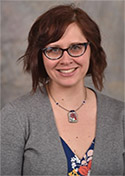 Kristin Arola is an Associate Professor in the Writing, Rhetoric, and American Cultures Department
at Michigan State University. Arola’s research and teaching focuses on the intersections
between American Indian rhetoric, multimodal pedagogy, and digital rhetoric. Specifically,
she’s interested in how to best teach composing, be that composing through words,
designs, images, beads, quillwork, or any other form of textual making.
Kristin Arola is an Associate Professor in the Writing, Rhetoric, and American Cultures Department
at Michigan State University. Arola’s research and teaching focuses on the intersections
between American Indian rhetoric, multimodal pedagogy, and digital rhetoric. Specifically,
she’s interested in how to best teach composing, be that composing through words,
designs, images, beads, quillwork, or any other form of textual making.
Along with numerous essays and book chapters, she is the co-author of Writer/Designer: A Guide to Making Multimodal Projects, and the co-editor of CrossTalk in Comp Theory and Composing(Media)=Composing(Embodiment). Her recent article, “An Ethics of Assemblage: Creative Repetition and the Electric Pow Wow” won the 2017 Ellen Nold Award for Best Article in Computers and Composition Studies.
Techne and Care for the Rhetoric of Health and Medicine
The Landmark Lecture is an annual event that brings together faculty, staff, students, alumni, and guests for an afternoon of discussion and investigation into different aspects of rhetorical study. Previous years have brought in scholars of visual rhetoric, demagoguery and deliberation, queer theory, the history and development of writing programs, and many more. The Department of Rhetoric and Writing Studies is excited to host Professors Jordynn Jack and Blake Scott’s panel on the rhetoric of health and medicine.
Panelists:
 Jordynn Jack is a Professor of English and Comparative Literature at the University of North Carolina
at Chapel Hill, where she also serves as the Associate Director of the Literature,
Medicine, and Culture Program. She locates her scholarship at the intersection of
two subfields within the interdisciplinary field of rhetorical scholarship: feminist
rhetorics and the rhetoric of science. Professor Jack’s books include Science on the
Homefront: The Rhetoric of Women Scientists in World War II (University of Illinois
Press 2009) and Autism and Gender: From Refrigerator Mothers to Computer Geeks (University
of Illinois 2014). Her current book project, Raveling the Brain, is a study of how
rhetorical theory and the neurosciences might inform each other.
Jordynn Jack is a Professor of English and Comparative Literature at the University of North Carolina
at Chapel Hill, where she also serves as the Associate Director of the Literature,
Medicine, and Culture Program. She locates her scholarship at the intersection of
two subfields within the interdisciplinary field of rhetorical scholarship: feminist
rhetorics and the rhetoric of science. Professor Jack’s books include Science on the
Homefront: The Rhetoric of Women Scientists in World War II (University of Illinois
Press 2009) and Autism and Gender: From Refrigerator Mothers to Computer Geeks (University
of Illinois 2014). Her current book project, Raveling the Brain, is a study of how
rhetorical theory and the neurosciences might inform each other.
 Blake Scott is a Professor of Writing and Rhetoric at the University of Central Florida. He served
as a founding Associate Chair and Director of Degree Programs of the Department of
Writing and Rhetoric, leading the creation of three new undergraduate programs (including
a B.A. in Writing & Rhetoric). He is interested in the rhetoric of health and medicine,
rhetorical history and theory, professional and technical communication, and theories
of writing and writing program develop ment. Professor Scott’s books include Risky
Rhetoric: AIDS and the Cultural Practices of HIV Testing (Southern Illinois University
Press 2003) and Methodologies for the Rhetoric of Health & Medicine, coedited with
Lisa Meloncon (Routledge 2017). He is the coeditor of the newly minted journal Rhetoric
of Health & Medicine.
Blake Scott is a Professor of Writing and Rhetoric at the University of Central Florida. He served
as a founding Associate Chair and Director of Degree Programs of the Department of
Writing and Rhetoric, leading the creation of three new undergraduate programs (including
a B.A. in Writing & Rhetoric). He is interested in the rhetoric of health and medicine,
rhetorical history and theory, professional and technical communication, and theories
of writing and writing program develop ment. Professor Scott’s books include Risky
Rhetoric: AIDS and the Cultural Practices of HIV Testing (Southern Illinois University
Press 2003) and Methodologies for the Rhetoric of Health & Medicine, coedited with
Lisa Meloncon (Routledge 2017). He is the coeditor of the newly minted journal Rhetoric
of Health & Medicine.
Encountering Visual Phenomena: A Conversation
The RWS Landmark Lecture series invites prominent scholars in Rhetoric and Writing
Studies to discuss current research and pedagogy in our field. This year’s lecture
examines the power and possibility of visual rhetoric.
Pictures and images seem to hold a lot of power. People tear down statues of discredited
leaders, deface political signs, and circulate photographs of atrocities. Iconoclasm
goes beyond smashing idols, becoming a general desire to control images and their
effects. Much early scholarship on visual rhetoric started from that wide-spread assumption
of powerful pictures. It “read” visual images, interpreted their possible meanings,
and ascribed them significant persuasive effect. In their discussion, Professors Haskins
and Olson move in a different direction—beyond pictures themselves—to track how we
encounter visual phenomena, what they actually do, and why we experience them as powerful.
Along the way, they will talk about citizenship, commemoration, protest, and social
change as thoroughly visual and thoroughly rhetorical matters.
Panelists:
 Ekaterina Haskins is Professor of Rhetoric at Rensselaer Polytechnic Institute. Her research contributes
to three distinct yet related areas of scholarship: the history of rhetoric, public
memory, and rhetorics of display. She is the author of Logos and Power in Isocrates
and Aristotle (2004; paperback 2009) and Popular Memories: Commemoration, Participatory
Culture, and Democratic Citizenship (2015) and has published numerous articles and
book chapters on the history of rhetoric, public memory, and visual culture.
Ekaterina Haskins is Professor of Rhetoric at Rensselaer Polytechnic Institute. Her research contributes
to three distinct yet related areas of scholarship: the history of rhetoric, public
memory, and rhetorics of display. She is the author of Logos and Power in Isocrates
and Aristotle (2004; paperback 2009) and Popular Memories: Commemoration, Participatory
Culture, and Democratic Citizenship (2015) and has published numerous articles and
book chapters on the history of rhetoric, public memory, and visual culture.
 Christa Olson is Associate Professor of Composition & Rhetoric at the University of Wisconsin-Madison.
She is the author of Constitutive Visions: Indigeneity and Commonplaces of National
Identity in Republican Ecuador. Her publications address hemispheric rhetorics, historiographic
methods, visual culture, and theories of nationalism and the public. She also regularly
writes for the online news photo and media image analysis site Reading the Pictures.
Christa Olson is Associate Professor of Composition & Rhetoric at the University of Wisconsin-Madison.
She is the author of Constitutive Visions: Indigeneity and Commonplaces of National
Identity in Republican Ecuador. Her publications address hemispheric rhetorics, historiographic
methods, visual culture, and theories of nationalism and the public. She also regularly
writes for the online news photo and media image analysis site Reading the Pictures.
Demagoguery, Deliberation, and Democratic Hope
The Landmark Lecture in Rhetoric series invites prominent scholars in Rhetoric and Writing Studies to discuss current research and pedagogy in our field. This year's speakers will offer a provocative discussion about pathologies of deliberation and critical perspectives on demagoguery, while probing questions regarding the role of rhetoric as a discipline in public discourse. A brief question and answer session will follow the presentations.
Panelists:
 Patricia Roberts-Miller is Professor of Rhetoric and Writing at The University of Texas at Austin.
Patricia Roberts-Miller is Professor of Rhetoric and Writing at The University of Texas at Austin.
She is the author of Fanatical Schemes: Proslavery Rhetoric and the Tragedy of Consensus, Deliberate Rhetoric: Composition Classes and Political Spacesand Voices in the Wilderness: The Paradox of the Puritan Public Sphere. She has published numerous articles on rhetorical theory, history, and pedagogies
of public argumentation.
 James Crosswhite is Professor of English at the University of Oregon.
James Crosswhite is Professor of English at the University of Oregon.
He is author of Deep Rhetoric: Philosophy, Reason, Violence, Justice, Wisdom and The Rhetoric of Reason. His extensive publications focus on the history and theory of rhetoric, particularly
intersections between rhetoric and philosophy.
Whitewashing, Flattening, and the (Im)Possibility of Collectivity.
Nearly 20 years ago Lynn Worsham identified the most “pressing task for feminism’s third wave” as forging “a collective subject capable of making mass movement—if not a sisterhood, exactly, then surely an alliance that does not protect us from our differences but finds in difference, disagreement, and even despair occasions to hear one another’s words” (1998, 329).
In this session our panelists use queer theory and their own narrative writing to explore the possibility or impossibility of creating the collective subject that Worsham envisions. They take seriously Worsham’s claim “that there is no need to eradicate difference to find solidarity” (329) by exploring such important challenges to creating collectivity as whitewashing and flattening.
Panelists:
 Jonathan Alexander is Professor of English, Education, and Gender & Sexuality Studies at UC, Irvine,
where he is the founding Director of the Center for Excellence in Writing and Communication.
The author, co-author, or editor of nine books, Jonathan writes about sexuality,
technology, and literacy — sometimes all at the same time. He is the general editor
of College Composition and Communication.
Jonathan Alexander is Professor of English, Education, and Gender & Sexuality Studies at UC, Irvine,
where he is the founding Director of the Center for Excellence in Writing and Communication.
The author, co-author, or editor of nine books, Jonathan writes about sexuality,
technology, and literacy — sometimes all at the same time. He is the general editor
of College Composition and Communication.
 Jacqueline Rhodes is Professor of English at California State University, San Bernardino. She is the
author of Radical Feminism, Writing, and Critical Agency: From Manifesto to Modem (SUNY, 2005) and co-author of On Multimodality: New Media in Composition Studies (NCTE, 2014). She has written and presented widely on her research into the intersections
of gender, sexuality, and writing.
Jacqueline Rhodes is Professor of English at California State University, San Bernardino. She is the
author of Radical Feminism, Writing, and Critical Agency: From Manifesto to Modem (SUNY, 2005) and co-author of On Multimodality: New Media in Composition Studies (NCTE, 2014). She has written and presented widely on her research into the intersections
of gender, sexuality, and writing.
 David Wallace is Dean of the College of Liberal Arts at the California State University, Long Beach.
He is author of Compelled to Write: Alternative Rhetoric in Theory and Practice and coauthor of Mutuality in the Rhetoric and Composition Classroom. He has also written a number of articles and book chapters about issues related
to diversity and the teaching of writing.
David Wallace is Dean of the College of Liberal Arts at the California State University, Long Beach.
He is author of Compelled to Write: Alternative Rhetoric in Theory and Practice and coauthor of Mutuality in the Rhetoric and Composition Classroom. He has also written a number of articles and book chapters about issues related
to diversity and the teaching of writing.
Dr. Barry Maid, Professor at Arizona State University
The Writing Major: Making Connections
The rise of social media seems to have created a culture where “being connected” or “having a network” has become an important goal for individuals. The reality is that networking or connecting has always been important – whether for individuals or academic programs. While the almost ephemeral nature many tend to associate with the use of social media may have an effect of diluting the importance of connection, in most instances we still tend to connect with those we feel we have some kind of shared values – whether that feeling is real or just perceived.
Writing majors have the potential to help both students and academic programs make connections. While writing programs deliver a core function at all universities, they are often perceived as merely being “service units.” A strong major, however, helps writing programs change their image into being a connected and respected member of the academic community. Likewise, a strong writing major has connections to the external community. An effective writing major not only helps its students achieve the academic goals of the major, but also uses its external partners to help connect individual students with people and networks outside the university. In fact, a truly successful writing major will create a cycle of success where alumni reach out to current students. Those students then graduate, move on to careers, and then reach back to the program to connect with new generations of students.
The Department of Rhetoric and Writing Studies at San Diego State University has recently been approved to offer a major in Rhetoric and Writing Studies. This is a wonderful opportunity for the department to develop connections both in and outside the university in order to provide a strong and relevant educational experience for their students. In his upcoming presentation, Dr. Maid will suggest some ideas that the Department of Rhetoric and Writing Studies may want to consider as they implement their new major.
Dr. Maid is a Professor and former program head of Technical Communication at Arizona State University. He has been involved with the 4C’s Committee on the Major in Rhetoric and Composition; published numerous articles and chapters on technology, independent writing programs, and program administration; and is a co-author of The McGraw-Hill Guide: Writing for College, Writing for Life.
Watch the video at https://www.youtube.com/embed/k-mj236sPho.
11th Landmark Lecture - April 25, 2013
Dr. Susan McLeod, UCSB
Writing Departments and the Major: Past, Present, and Future
Susan McLeod will trace the history of departments of writing as they separated from English departments to form their own units. She will also discuss the development of the writing major & outline the work that she sees necessary to ensure that the majors developed in these new departments are consistent & coherent.
Watch the video at https://www.youtube.com/embed/ZtxchDM_UZA
10th Landmark Lecture – April 5, 2012
Michael-John DePalma, Baylor University
Assessing Adaptive Transfer in Community-Based Writing
This empirical study discusses the implications of using Michael-John DePalma and
Jeffrey M. Ringer’s framework of adaptive transfer to assess students’ learning in
community-based writing projects. Drawing from a series of interview-based case studies
of students enrolled in my Technical and Professional Writing courses at Baylor University,
this chapter describes how students both apply and reshape learned writing knowledge
in order to negotiate new and unfamiliar community-based writing tasks. By assessing
the kinds of transfer that students describe as they move between the activity systems
of the classroom, their community sites, and beyond, this project provides the kind
of empirical data on student learning that is currently lacking in community-based
writing research. Moreover, it offers a rich framework for assessing how students
adapt writing knowledge and experience to fit unfamiliar community-based writing tasks.
By offering a framework and method for assessing the transfer of writing knowledge
in community-based writing courses, this study contributes in significant ways to
extant discussions of learning transfer in community-based writing scholarship.
9th Landmark Lecture - April 21, 2011
Professor René de los Santos, DePaul University
Vocero of the Revolution: Francisco Olazábal and The Rhetoric of Mexican Religious
Nationalism
8th Landmark Lecture - February 10, 2010
Shirley Wilson Logan, University of Maryland
Free-Floating Literacies, Then and Now
7th Landmark Lecture - April 13, 2009
Professors Jeanne Gunner and Douglas Sweet
Rhetorical Uses of Critical Frames: Theory/ies in the Writing Class
6th Landmark Lecture - October 11, 2007
Professor Susan Romano, University of New Mexico
Prepositions and Placentas: The Cultural Resources of Rhetorical Encounter in Colonial
Mexico
5th Landmark Lecture - Spring 2007
Louise Wetherbee Phelps, Syracuse University
Internationalization and Writing Curricula
4th Landmark Lecture - November 16, 2006
Professor Ralph Cintron, University of Illinois, Chicago
Ratios: Transparencies/Opacities-- A Critical Inquiry into Democracy and Democratic
Rhetorics
3rd Landmark Lecture - October 19, 2005
Professor John Gage, University of Oregon
The Pursuit of Rhetorical Virtue
2nd Landmark Lecture - September 28, 2004
Charles Bazerman, UCSB and Steven Mailloux, University of California, Irvine
The Future of Rhetorical Studies
1st Landmark Lecture - September 18, 2003
Susan Jarratt, University of California, Irvine
Libanius's Antioch: Rhetorical Constructions Of The Greek (Cosmo) Polis Under Empire
Philippe Salazar, University of Cape Town
Inventing Democracy: The South African Experience